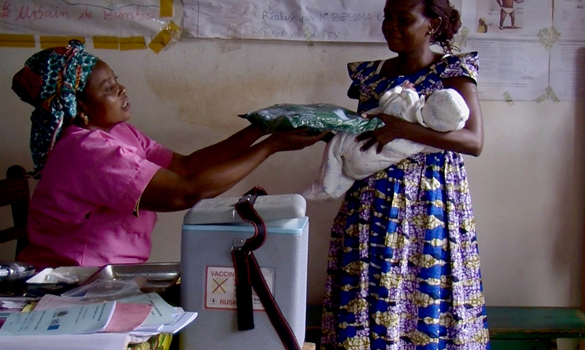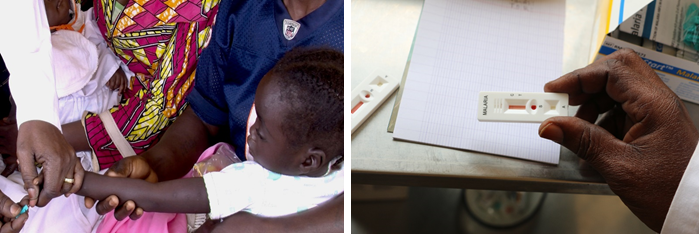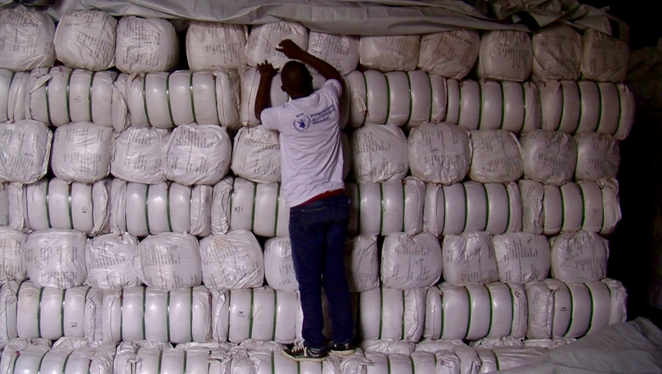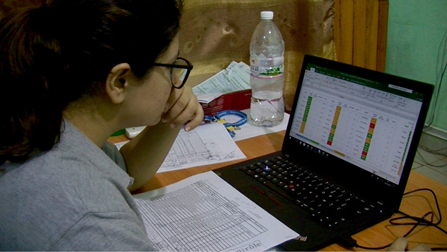Delivering health in the Central African Republic
by Elizabeth Bryant
BANGUI, Central African Republic — Cradling her 2-week-old son in one arm, Adeline Ngoungoudro, 35, scoops up the mosquito net offered as part of a child vaccination drive. She has no doubts about its utility.

"I'm going to put it up in my home so my baby can sleep under it," she says, crediting the protection for helping to keep her two other children malaria-free.
Distributed to infants and pregnant women, the nets are part of a massive anti-malaria campaign — one of the activities conducted by World Vision as part of their work for the Global Fund in the Central African Republic, one of the world's poorest and most fragile nations. Over the project's lifetime, close to 3.5 million mosquito nets will be delivered across the country, in a broader bid to slash malaria rates by 40 percent by 2021.
A three-year, 56-million-euro investment by the Global Fund sees the country's health ministry teaming up with two leading humanitarian organizations — the French Red Cross and World Vision — to sharply cut the prevalence of all HIV, tuberculosis and malaria epidemics in the country.
The UN World Food Programme (WFP) is lending its logistical expertise to the initiative, by helping partners better assess current stocks and future needs, and by storing and delivering medications and other supplies by plane, truck, motorbike and even canoe.

"The Global Fund's support is considerable — it covers about 75 percent or more of the financing, especially for medications," says Dr. Marie-Charlotte Banthas, Director of the Contagious Diseases unit at the Health and Population Ministry. "That allows us to reach people across the country."
Still, the challenges are immense. Years of conflict have uprooted one-fifth of the country's population, destroyed health centers, stalled development and amount — along with the country's fragile infrastructure — to a major barrier in reaching some of the most vulnerable communities.
"We need more funds to fill the gaps," says Dr Banthas, calling for more partners to step up.
The project has already been delivering dividends since its launch in 2018 and has provided access to antiretroviral treatment to more than 43,000 people living with HIV/AIDS. Increased reporting and access to health facilities have led to an overall reduction of malaria mortality.
"There's also been a significant increase in malaria diagnoses," says Olivier Byicaza, who heads the Global Fund Malaria Programme for World Vision in CAR.
Malaria: CAR's leading killer
From his small office at Bimbo Hospital outside Bangui, chief doctor Julien Iya describes the local fallout of the country's biggest killer.
"Malaria is the top disease here," he says. "It accounts for about 7 out of 10 cases."
Bimbo district is not an isolated example. Malaria is not only CAR's most common illness, but it accounts for half of all deaths, especially among children under 5.

But on a recent rainy morning, a pair of World Vision trucks drove through the muddy entrance loaded with insecticide-treated bed nets as part of routine deliveries that ensure health centers receive the bed nets when needed.
"We're confident that the reduction goals can be reached," World Vision's Byicaza says. "The indicators are good."

Taking stock
The sprawling grounds of Bangui Community Hospital are packed with patients. Like many in CAR, the health facility is bare bones — the paint peeling, the rooms dimly lit. Yet, the situation is better than in other health centres, nearly one-quarter of which were left partially or totally destroyed by the recent crisis, according to government figures.
Down a hall, Evariste, a health worker, updates information on the hospital's stock and consumption of medications using a mobile phone application developed by WFP to support the French Red Cross' HIV and tuberculosis programmes. The app, which offers a much swifter assessment of needs and supplies than previously, is now piloted in 15 Bangui health facilities with plans to expand,

WFP Logistics is also supporting its Global Fund partners World Vision and the French Red Cross with the bigger, country-wide picture. Its tailor-made dashboard offers a comprehensive snapshot of overall needs, existing stocks and expiry dates, so partners can better plan ahead and identify bottlenecks.

"The dashboard gives us a clear picture of the entire supply chain," says Dr. Pierre-Prince Lunjwire Mulemangabo, French Red Cross Coordinator of the Global Fund HIV and TB programmes in CAR. "It tells us, for example, which medications will be arriving and when."
The partnership's benefits go both ways, says Vivens Nzabikiramo, Project Manager of the WFP Global Fund CAR operation.
"People know us as the organization that delivers food and nutrition assistance," Nzabikiramo says. "Now we're supporting partners to meet health needs as well. It's an added value to WFP."
Most recently, WFP created a new dashboard to support World Vision's mosquito net mass campaign, which plans to deliver 1.6 million life-saving nets across western CAR this year.
Tackling HIV/AIDS
At Bouar District Hospital, some 400 kilometres northwest of the capital, health worker Josee Koliko hands to a bottle of antiretroviral drugs to Esther who, like her 5-year-old daughter, is HIV-positive. Both take Global Fund-financed medications, which would otherwise be beyond their means.
"It's a pill once in the morning and once in the evening," says Esther, who makes an hour-long trek monthly to collect the drugs. "I won't forget."
About 4 percent of CAR's population is HIV-positive — one of the region's highest rates. The Global Fund project aims to turn those numbers around. In 2019, more than 45,000 patients were on antiretroviral treatment, according to the French Red Cross.
Seated amid rolling green hills where farmers grow yams, cassava and groundnuts, the market town of Bouar has one essential asset: a fragile peace, allowing both medications and patients to reach health centres.
But past unrest, along with the numbers of people passing through the town, strategically located on the main artery linking Bangui to Cameroon, was the trigger for gender-based violence, which pushed HIV rates up.
Today, the district hospital counts more than 400 regular HIV patients, health worker Dr Koliko says. Most follow their treatment, she adds, after getting counseling about the risks of not doing so.
"They don't want to die," Dr Koliko says.
Going the last mile to fight tuberculosis

Greater security in parts of the country has also helped Global Fund partners to reach more people with tuberculosis (TB). By 2021, the project aims to offer treatment to all of the country's roughly 20,000 annual cases — nearly double current figures — and cut tuberculosis-related deaths by more than one-third from 2015 numbers.
"Tuberculosis remains a major public health problem in CAR," says Dr Lunjwire Mulemangabo of the French Red Cross. The country's most vulnerable groups, including internally displaced people, are often hardest hit.
For now, the medicines supplied are keeping the TB epidemic in check — at least in Bouar, says Brother Angelo Sala, director of the town's St. Michel Health Centre.
"If we didn't have Global Fund support, it would be catastrophic," he adds.
Sala remembers darker days a few years ago, when insecurity brought local deliveries to a halt. With no alternative, Sala would drive to Bangui to collect the medications himself, passing through barriers controlled by various armed groups.
Today, WFP delivers those supplies door-to-door.
"With peace now in Bouar, we've really seen a big change," Sala says. "Medical staff have returned. People are adhering more to their treatment. Life has returned to a semblance of normality."
The Global Fund is a partnership designed to accelerate the end of AIDS, tuberculosis and malaria as epidemics. As an international organization, the Global Fund mobilizes and invests more than US$ 4 billion a year to support programs run by local experts in more than 100 countries.
